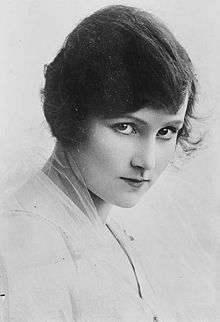Mary Rose (play)
Mary Rose is a play by J. M. Barrie, who is best known for Peter Pan. It was first produced in April 1920 at the Haymarket Theatre, London, with incidental music specially composed by Norman O'Neill.[1] The play was produced in New York that year. Later it received revivals in New York in 2007 and in London in 2012.
Plot
This is the fictional story of Mary Rose, a girl who vanishes twice.[1] As a child, Mary Rose was taken by her father to a remote Scottish island. While she is briefly out of her father's sight, Mary Rose vanishes. The entire island is searched exhaustively. Twenty-one days later, Mary Rose reappears as mysteriously as she disappeared…but she shows no effects of having been gone for three weeks, and she has no knowledge of any gap or missing time.
Years later, as a young wife and mother, the adult Mary Rose persuades her husband to take her to the same island. Again she vanishes: this time for a period of decades. When she is found again, she is not a single day older and has no awareness of the passage of time. In the interim, her son has grown to adulthood and is now physically older than his mother.
Productions

Mary Rose first opened in London at the Haymarket Theatre, running from April 22, 1920 to February 26, 1921, with Fay Compton as Mary Rose, a role which was written for her by Barrie.[2] Barrie, who normally wrote with his right hand, wrote Mary Rose with his left hand due to a "writer's cramp".[3]
Mary Rose opened that year in New York on Broadway at the Empire Theatre, running from December 22, 1920 to April 1921. Direction was by Ben Iden Payne with Ruth Chatterton as Mary Rose.[4]
A revival ran on Broadway at the ANTA Playhouse, running from March 4, 1951 to March 16, 1951. The play was directed by John Stix, produced by Helen Hayes, with Mary Rose played by Bethel Leslie.[5]
The play was revived off-Broadway by the Vineyard Theater in 2007. The play was produced in a London revival in 2012 at Riverside Studios.
Reception
In 1921, the play was included in Best Plays of 1920–1921.
The New York Times reviewer called the 2007 revival of the play an "elegantly plotted ghost story". He noted, "The play is in many ways a more mature and mournful reworking of themes Barrie explored in the tale of the boy Peter Pan who refused to grow up. Time is seen as a quiet despoiler of happiness and innocence, and the lure of another world unblemished by its passing has an irresistible seduction."[6]
Of its London revival in 2012, a reviewer wrote that the play "...reveals a somewhat uncomfortable preoccupation with childhood innocence extending some of the themes of [Peter] Pan; the child who cannot grow up, and meditation on death and loss."[7]
Adaptations
Alfred Hitchcock had seen the play as a young man in its original production. Later in his career as a film director, he wanted to film it, asking Jay Presson Allen to write a screenplay after she had written the screenplay for Hitchcock's film Marnie (1964). However, Hitchcock was under contract to Universal Pictures at the time, and the studio believed that the project was "too troubling", with not enough commercial appeal, so would not approve production.[8]
In 2016, a radio play adaptation of Mary Rose was broadcast on BBC Radio 3. It was adapted and directed by Abigail le Fleming with music composed and performed by cellist Laura Moody.[9]
See also
Notes
- 1 2 Everybody's magazine, Volume 43, page 30, December 1920.
- ↑ Yahoo Movies, accessed March 4, 2013
- ↑ Heywood Broun, Seeing Things at Night, page 127, 1921
- ↑ Mary Rose, 1920 Internet Broadway Database, accessed November 11, 2012
- ↑ Mary Rose, 1951 Internet Broadway Database, accessed November 11, 2012
- ↑ Isherwood, Charles. "Theater Review. 'Mary Rose'" The New York Times, February 21, 2007
- ↑ "Review: 'Mary Rose', Riverside Studios", Fourth Wall Magazine, April 4, 2012
- ↑ Joseph McBride, An Old Master's Unheard Cri de Coeur: Alfred Hitchcock's Mary Rose, Cineaste volume 26, issue 2 (01/Mar/2001), pages 24-28
- ↑ "Mary Rose, Drama on 3 - BBC Radio 3". BBC. Retrieved 2016-10-23.